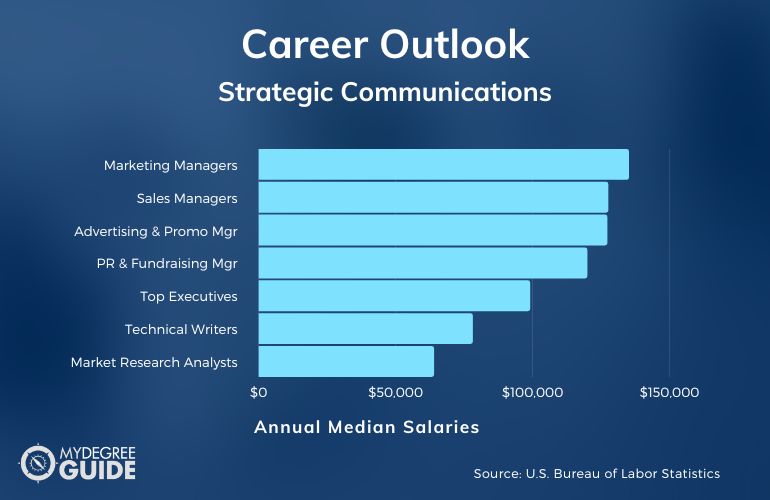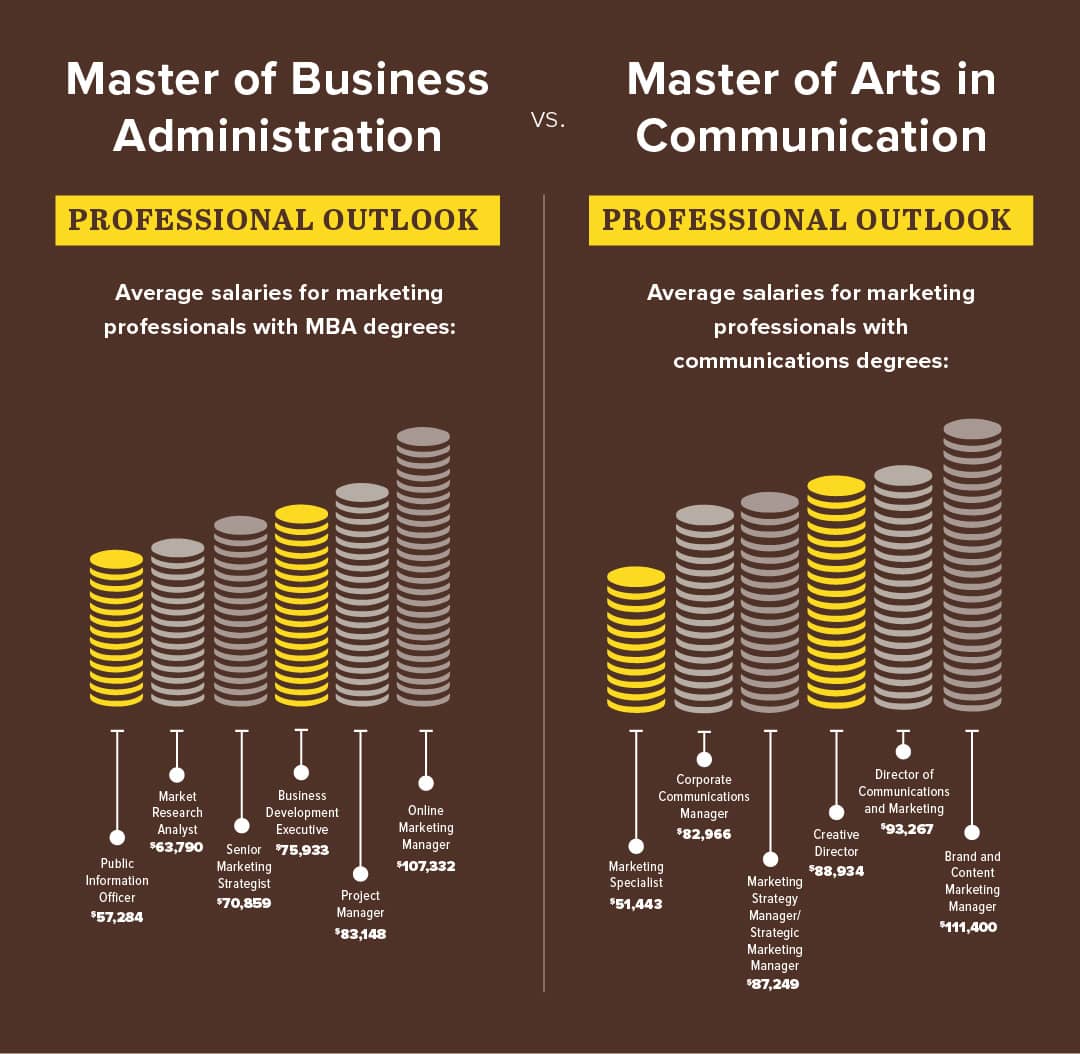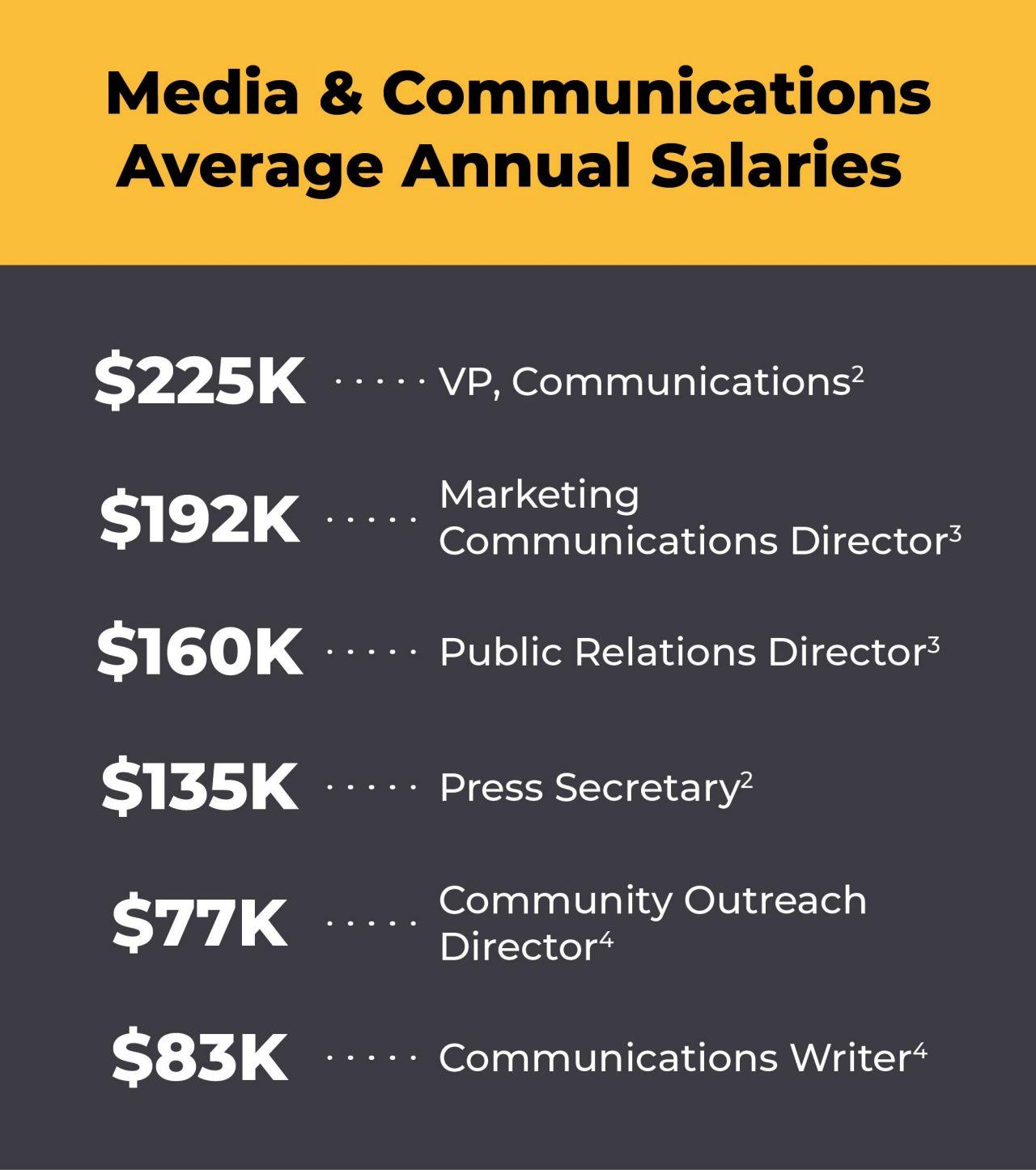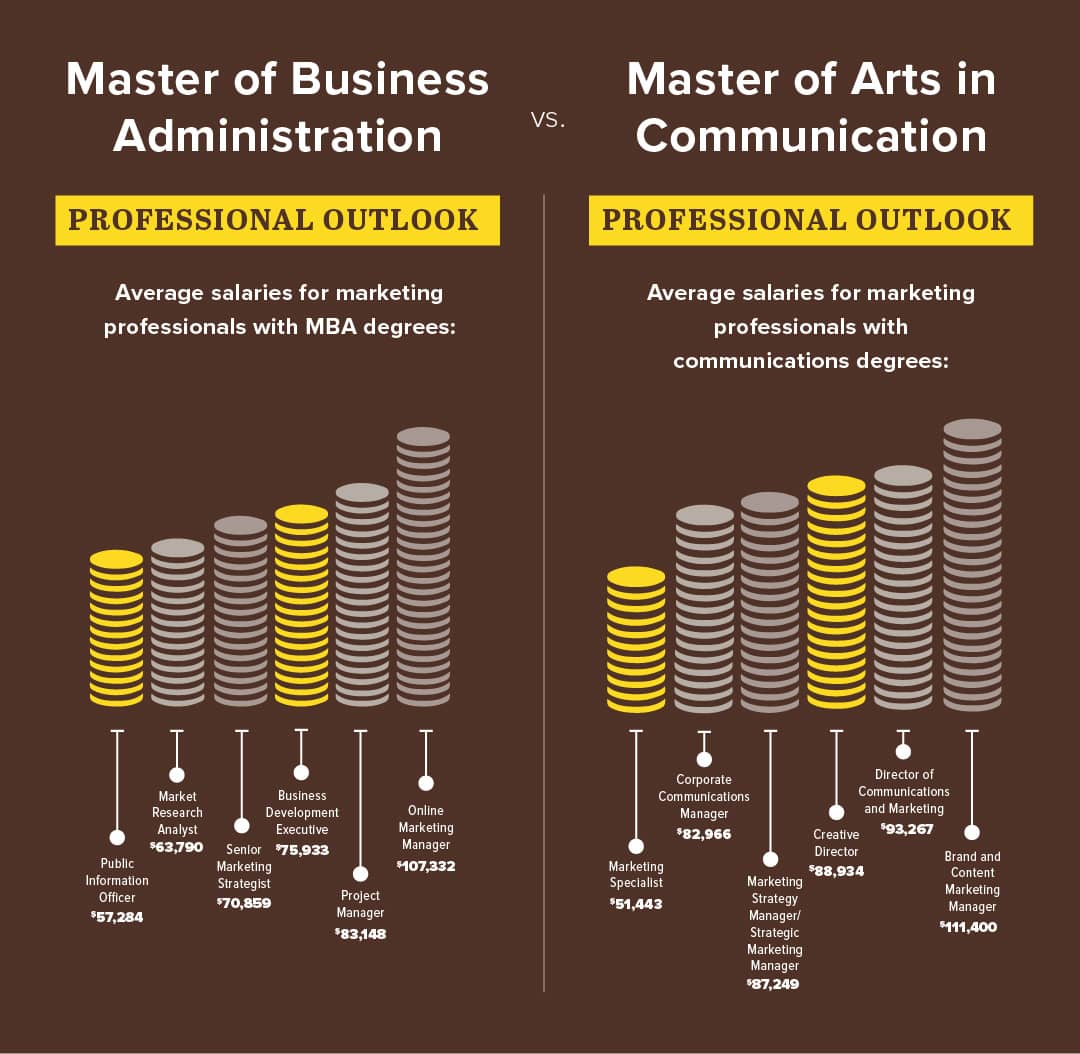-
Is an MS in Strategic Communications Worth It if You Already Have a Marketing Degree?
- What is Strategic Communications and How Does It Differ from Marketing?
- How Can an MS in Strategic Communications Complement a Marketing Degree?
- What Career Opportunities Does an MS in Strategic Communications Open Up?
- What Skills Will You Gain from an MS in Strategic Communications?
- Is the Investment in an MS in Strategic Communications Justifiable?
- How Does an MS in Strategic Communications Enhance Your Professional Network?
- Is a Master's in strategic communication worth it?
-
Is a communications degree better than a marketing degree?
- What Are the Key Differences Between a Communications Degree and a Marketing Degree?
- Which Degree Offers Better Career Opportunities: Communications or Marketing?
- How Do the Skills Developed in Communications and Marketing Degrees Compare?
- Which Degree Is More Versatile: Communications or Marketing?
- What Are the Salary Expectations for Communications and Marketing Graduates?
- What is the difference between strategic communications and marketing?
- What can you do with a Master's in strategic communication?
-
Frequently Asked Questions (FAQ)
- How does an MS in Strategic Communications complement a marketing degree?
- What career opportunities can an MS in Strategic Communications open up?
- Is the investment in an MS in Strategic Communications justified for someone with a marketing background?
- How does the curriculum of an MS in Strategic Communications differ from a marketing degree?
Pursuing a Master of Science (MS) in Strategic Communications can be a significant decision, especially for those who already hold a marketing degree. While a marketing background provides a solid foundation in understanding consumer behavior, branding, and promotional strategies, an MS in Strategic Communications delves deeper into the art of crafting and delivering impactful messages across various platforms. This advanced degree focuses on building expertise in areas such as crisis communication, digital media strategies, and organizational storytelling. For professionals seeking to enhance their strategic thinking, leadership skills, and ability to influence audiences, this degree may offer a competitive edge in an increasingly communication-driven world.
Is an MS in Strategic Communications Worth It if You Already Have a Marketing Degree?
What is Strategic Communications and How Does It Differ from Marketing?
Strategic communications focuses on crafting and delivering messages to achieve specific goals, often within organizations or public relations contexts. While marketing emphasizes promoting products or services to drive sales, strategic communications is broader, encompassing internal communications, crisis management, and reputation building. If you already have a marketing degree, pursuing an MS in Strategic Communications can deepen your understanding of message development, audience engagement, and organizational storytelling.
See Also Is an MS in Strategic Communications Worth It if I Already Have a Marketing Degree?
Is an MS in Strategic Communications Worth It if I Already Have a Marketing Degree?How Can an MS in Strategic Communications Complement a Marketing Degree?
An MS in Strategic Communications can complement your marketing background by enhancing your ability to manage brand narratives, crisis communication, and stakeholder relationships. For example, while marketing focuses on customer acquisition, strategic communications ensures that the brand's message aligns with its values and resonates with diverse audiences. This combination can make you a more versatile professional in roles like corporate communications, public relations, or content strategy.
What Career Opportunities Does an MS in Strategic Communications Open Up?
With an MS in Strategic Communications, you can explore roles such as Communications Director, Public Relations Manager, or Corporate Strategist. These positions often require advanced skills in message crafting, media relations, and crisis management, which are not typically covered in-depth in a marketing degree. The table below highlights some career paths and their average salaries:
See Also What Is the Entry Job for Marketing Analytics?
What Is the Entry Job for Marketing Analytics?| Job Title | Average Salary |
|---|---|
| Communications Director | $120,000 |
| Public Relations Manager | $95,000 |
| Corporate Strategist | $110,000 |
What Skills Will You Gain from an MS in Strategic Communications?
An MS in Strategic Communications equips you with advanced skills in strategic planning, media relations, and crisis communication. You'll also learn to analyze audience behavior, develop integrated communication campaigns, and manage reputation risks. These skills are highly transferable and can enhance your ability to lead communication efforts in various industries.
Is the Investment in an MS in Strategic Communications Justifiable?
The decision to pursue an MS in Strategic Communications depends on your career goals and the return on investment (ROI). If you aim to transition into leadership roles or specialize in corporate communications, the degree can provide a significant advantage. However, it's essential to weigh the costs against potential salary increases and career advancements. Research programs with strong alumni networks and industry connections to maximize your investment.
See Also How Many of You in Marketing Work 100% Remotely?
How Many of You in Marketing Work 100% Remotely?How Does an MS in Strategic Communications Enhance Your Professional Network?
Graduate programs in strategic communications often provide access to industry professionals, alumni networks, and internship opportunities. These connections can be invaluable for career growth, offering mentorship, job referrals, and collaborative projects. Networking through your program can open doors to roles in top-tier organizations and help you stay updated on industry trends.
Is a Master's in strategic communication worth it?

 I Created 4 Graphics Explaining Social Media Marketing.
I Created 4 Graphics Explaining Social Media Marketing.What is Strategic Communication?
Strategic communication involves the purposeful use of communication by an organization to fulfill its mission. It encompasses various disciplines such as public relations, marketing, and corporate communication. A Master's in Strategic Communication equips students with the skills to craft and deliver messages that align with organizational goals. Key aspects include:
- Message Development: Creating clear and impactful messages tailored to specific audiences.
- Audience Analysis: Understanding the needs and preferences of different audience segments.
- Crisis Communication: Managing communication during emergencies to protect an organization's reputation.
Career Opportunities with a Master's in Strategic Communication
Graduates with a Master's in Strategic Communication can pursue a variety of roles across industries. The degree opens doors to positions that require advanced communication skills and strategic thinking. Some notable career paths include:
See Also What Are Some Direct-to-Consumer Brands That You Admire and Why?
What Are Some Direct-to-Consumer Brands That You Admire and Why?- Public Relations Manager: Overseeing the public image of an organization.
- Corporate Communications Director: Leading internal and external communication strategies.
- Marketing Strategist: Developing marketing campaigns that align with business objectives.
Skills Gained from a Master's in Strategic Communication
A Master's in Strategic Communication provides students with a robust set of skills that are highly valued in the job market. These skills are essential for effective communication and strategic planning. Key skills include:
- Strategic Thinking: Ability to plan and execute communication strategies that align with organizational goals.
- Media Relations: Building and maintaining relationships with media outlets.
- Digital Communication: Leveraging digital platforms for effective communication.
Financial Investment and Return on Investment (ROI)
Pursuing a Master's in Strategic Communication requires a significant financial investment. However, the potential return on investment can be substantial, depending on various factors. Considerations include:
- Tuition Costs: Evaluating the cost of the program and available financial aid options.
- Salary Potential: Researching the earning potential for roles that require this degree.
- Career Advancement: Assessing how the degree can enhance career growth and opportunities.
Industry Demand for Strategic Communication Professionals
The demand for strategic communication professionals is on the rise, driven by the increasing complexity of communication channels and the need for effective messaging. Industries that highly value strategic communication include:
- Corporate Sector: Companies need skilled communicators to manage their brand and reputation.
- Non-Profit Organizations: Effective communication is crucial for fundraising and advocacy efforts.
- Government Agencies: Strategic communication is essential for public information and policy dissemination.
Is a communications degree better than a marketing degree?

What Are the Key Differences Between a Communications Degree and a Marketing Degree?
A communications degree focuses on the study of how information is created, shared, and interpreted across various platforms. It emphasizes skills like public speaking, writing, media production, and interpersonal communication. On the other hand, a marketing degree is centered on understanding consumer behavior, market research, branding, and strategies to promote products or services. While both fields overlap in areas like messaging and audience engagement, their core objectives differ significantly.
- Communications emphasizes storytelling and media.
- Marketing focuses on sales and consumer behavior.
- Both degrees require strong analytical and creative skills.
Which Degree Offers Better Career Opportunities: Communications or Marketing?
Both degrees offer diverse career paths, but the opportunities differ based on industry demand. A communications degree can lead to roles in journalism, public relations, media production, or corporate communications. Meanwhile, a marketing degree often opens doors to careers in advertising, digital marketing, brand management, or market research. The choice depends on your career goals and the industries you are passionate about.
- Communications careers include PR specialists and media planners.
- Marketing careers include digital marketers and brand managers.
- Both fields offer opportunities in creative and analytical roles.
How Do the Skills Developed in Communications and Marketing Degrees Compare?
A communications degree hones skills like effective writing, public speaking, and media literacy. It prepares students to craft compelling messages and work in dynamic environments. In contrast, a marketing degree develops skills in data analysis, consumer psychology, and strategic planning. Both degrees require creativity and adaptability, but the focus areas differ significantly.
- Communications emphasizes storytelling and media production.
- Marketing focuses on data-driven decision-making.
- Both degrees require strong interpersonal and problem-solving skills.
Which Degree Is More Versatile: Communications or Marketing?
Both degrees are versatile, but their applications vary. A communications degree is ideal for those interested in media, journalism, or public relations, offering flexibility across industries like entertainment, education, and non-profits. A marketing degree is more suited for business-oriented roles, such as advertising, sales, or product management, and is highly valued in corporate settings.
- Communications is versatile in media and public relations.
- Marketing is versatile in business and consumer-focused roles.
- Both degrees can be applied across multiple industries.
What Are the Salary Expectations for Communications and Marketing Graduates?
Salary expectations vary based on the role, industry, and location. Generally, marketing graduates tend to earn higher starting salaries due to the demand for skills in digital marketing and data analysis. Communications graduates may start with slightly lower salaries but can achieve competitive earnings in specialized fields like corporate communications or media production.
- Marketing roles often have higher entry-level salaries.
- Communications salaries increase with specialization and experience.
- Both fields offer potential for growth and higher earnings over time.
What is the difference between strategic communications and marketing?

Definition and Scope
Strategic communications focuses on crafting and delivering messages to achieve specific organizational goals, often involving internal and external stakeholders. It emphasizes building relationships, managing reputation, and aligning communication with long-term objectives. On the other hand, marketing is primarily concerned with promoting products or services to drive sales and revenue. It involves market research, advertising, and customer engagement strategies.
- Strategic communications targets a broader audience, including employees, investors, and the public.
- Marketing is more focused on consumers and potential buyers.
- Both disciplines use messaging but differ in their ultimate goals.
Objectives and Goals
The primary objective of strategic communications is to build trust, enhance reputation, and foster meaningful relationships with stakeholders. It often supports organizational missions and values. In contrast, marketing aims to increase brand awareness, generate leads, and drive conversions, with a strong emphasis on measurable outcomes like sales and ROI.
- Strategic communications seeks to influence perceptions and behaviors over time.
- Marketing focuses on immediate results and customer acquisition.
- Both aim to achieve organizational success but through different approaches.
Audience and Targeting
Strategic communications often addresses a diverse audience, including internal stakeholders like employees and external groups such as media, policymakers, and the general public. Marketing, however, is more narrowly focused on specific customer segments, tailoring messages to meet the needs and preferences of potential buyers.
- Strategic communications engages with a wide range of stakeholders.
- Marketing targets specific demographics or market segments.
- Both require audience analysis but differ in scope and application.
Tools and Tactics
Strategic communications employs tools like press releases, speeches, internal newsletters, and crisis management plans to convey messages effectively. Marketing relies on advertising campaigns, social media promotions, email marketing, and SEO to reach and engage customers.
- Strategic communications uses tools that emphasize transparency and trust-building.
- Marketing leverages tactics designed to drive immediate action and sales.
- Both disciplines use a mix of traditional and digital tools but for different purposes.
Measurement and Evaluation
In strategic communications, success is often measured through qualitative metrics like stakeholder satisfaction, brand reputation, and media coverage. Marketing, however, relies heavily on quantitative metrics such as sales figures, conversion rates, and customer acquisition costs to evaluate performance.
- Strategic communications focuses on long-term impact and relationship-building.
- Marketing prioritizes short-term results and financial performance.
- Both require evaluation but use different criteria to assess success.
What can you do with a Master's in strategic communication?

Career Opportunities in Strategic Communication
A Master's in Strategic Communication opens doors to a variety of career paths. Graduates can work in roles that require advanced communication skills, strategic planning, and the ability to manage complex messaging across different platforms. Some of the key career opportunities include:
- Public Relations Manager: Overseeing the public image of organizations, managing media relations, and developing communication strategies.
- Corporate Communications Director: Leading internal and external communication efforts, ensuring consistent messaging across all channels.
- Marketing Communications Specialist: Crafting and executing marketing campaigns that align with the organization's strategic goals.
Skills Developed Through a Master's in Strategic Communication
Pursuing a Master's in Strategic Communication equips students with a range of skills that are highly valued in the professional world. These skills are essential for effective communication and strategic planning in various industries. Key skills include:
- Strategic Thinking: The ability to develop long-term communication plans that align with organizational objectives.
- Crisis Communication: Managing and mitigating communication during crises to protect an organization's reputation.
- Digital Communication: Utilizing digital platforms and tools to enhance communication strategies and reach target audiences effectively.
Industries That Value Strategic Communication Expertise
Graduates with a Master's in Strategic Communication are sought after in various industries. Their expertise is crucial for organizations that need to manage their communication strategies effectively. Some of the industries include:
- Healthcare: Managing communication between healthcare providers, patients, and the public, especially during health crises.
- Technology: Crafting communication strategies for tech companies to explain complex products and services to consumers.
- Non-Profit: Developing communication plans to promote causes, engage donors, and advocate for social change.
Advanced Roles in Media and Public Relations
With a Master's in Strategic Communication, individuals can take on advanced roles in media and public relations. These roles require a deep understanding of how to craft and disseminate messages effectively. Key roles include:
- Media Relations Manager: Building and maintaining relationships with journalists and media outlets to ensure positive coverage.
- Public Affairs Specialist: Managing communication between organizations and the public, often in government or political settings.
- Social Media Strategist: Developing and implementing social media strategies to engage audiences and enhance brand presence.
Consulting and Freelance Opportunities
Graduates with a Master's in Strategic Communication often find opportunities in consulting or freelance work. These roles allow for flexibility and the ability to work with a variety of clients. Key opportunities include:
- Communication Consultant: Providing expert advice to organizations on how to improve their communication strategies.
- Freelance Writer/Editor: Creating content for various media outlets, including blogs, articles, and press releases.
- Brand Strategist: Helping companies develop and maintain a strong brand identity through effective communication strategies.
Frequently Asked Questions (FAQ)
How does an MS in Strategic Communications complement a marketing degree?
An MS in Strategic Communications can significantly enhance the skills and knowledge gained from a marketing degree by focusing on advanced communication strategies, crisis management, and stakeholder engagement. While a marketing degree provides a solid foundation in consumer behavior, market research, and branding, a strategic communications program delves deeper into crafting and delivering effective messages across various platforms. This combination can make you a more versatile professional, capable of integrating marketing tactics with strategic communication plans to achieve organizational goals.
What career opportunities can an MS in Strategic Communications open up?
Pursuing an MS in Strategic Communications can open doors to specialized roles such as Corporate Communications Manager, Public Relations Director, or Media Strategist. These positions often require a deep understanding of how to manage an organization's reputation, communicate with diverse audiences, and navigate complex media landscapes. With a marketing degree, you already have a strong foundation in understanding consumer needs and market dynamics. Adding a strategic communications degree can position you for leadership roles that require both marketing expertise and communication finesse.
Is the investment in an MS in Strategic Communications justified for someone with a marketing background?
The decision to pursue an MS in Strategic Communications depends on your career goals and the specific skills you wish to acquire. If you aim to specialize in areas like crisis communication, internal communications, or public affairs, the degree can be highly beneficial. The program often provides access to industry networks, advanced tools, and real-world case studies that can enhance your expertise. For those looking to transition into higher-level roles or industries where communication is paramount, the investment can be well worth it.
How does the curriculum of an MS in Strategic Communications differ from a marketing degree?
While a marketing degree typically focuses on market analysis, consumer behavior, and brand management, an MS in Strategic Communications emphasizes message development, media relations, and strategic planning. Courses often cover topics like digital communication, crisis management, and ethical communication practices. This curriculum is designed to prepare you for roles that require a nuanced understanding of how to communicate effectively in various contexts, making it a valuable complement to a marketing degree.
Leave a Reply


Articles of interest